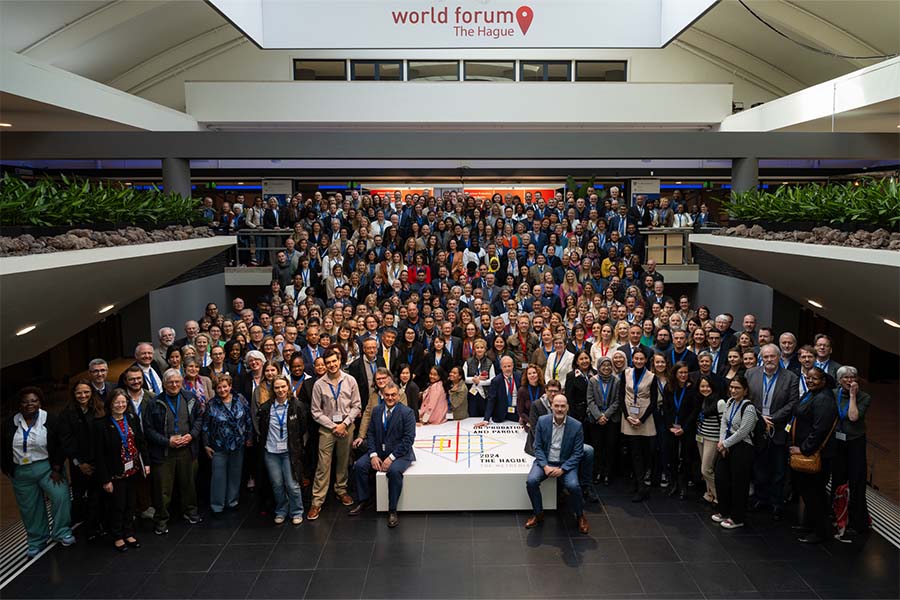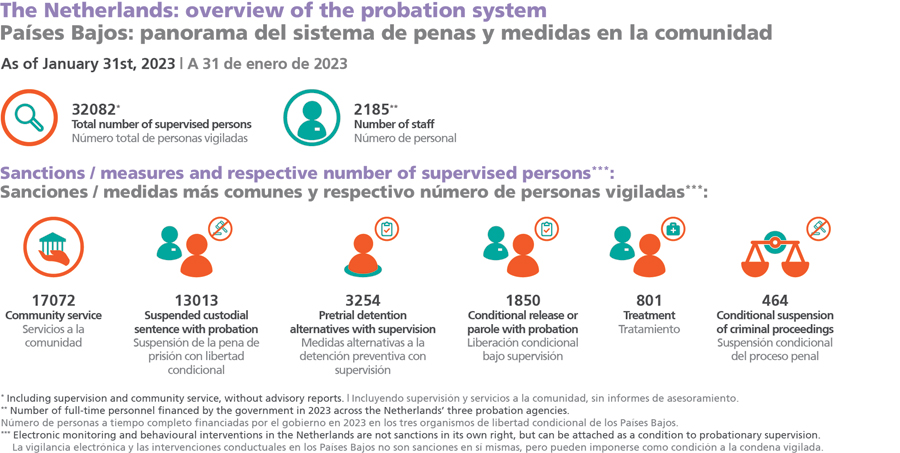Interview
Johan Bac
Director-General of the Dutch Probation Service
JT: As the Dutch Probation Service is celebrating its 200th anniversary, it has evolved significantly over time.
How would you describe the Service’s current core philosophy and mandate within the context of its role in the justice system and its interactions with other stakeholders?
JB: Over these two centuries, both our organisation and society have changed considerably. Our origins lie in philanthropy, originally privately funded, working solely with volunteers for decades, and ‘only’ assisting and supporting former prisoners, with no formal role in the judicial system.
Gradually, we have become an increasingly important part of the criminal justice system, with our trial reports, community sanctions supervision, etc. As we were increasingly funded by the government, our work has become more professionalised, developing quality standards, accountability criteria, and scientifically substantiated methods and interventions, among other advances.
Our current vision is that we work with criminals to prevent new victims. This means that we focus on the support and control of our clients, while also considering the interests of victims and society
We focus on what we call “close probation”, meaning being present in neighbourhoods and prisons, conducting community sanctions with many non-profit organisations, and closely cooperating with other formal and informal entities of society, both within the judicial system and in civil society. This also entails investing in our personnel, enhancing their skills and talents, and creating opportunities for collaboration and exchange of professional feedback through case studies.
We are convinced that they need each other for emotional and professional support, advice, and maintaining quality. Probationary work is not a job to be carried out alone.
The Dutch Probation Service collaborates closely with all justice partners – and increasingly with other stakeholders – during all stages of the criminal procedure: from the day of arrest until conditional release. We are responsible for writing reports for judges, prosecutors, and prison authorities; we oversee supervision, including electronic monitoring; we are responsible for the execution of all community sanctions; and we organise behavioural training sessions.
We are a private, independent organisation, not part of the prison system, funded by the Ministry of Justice and Security, along with our specialised colleagues of the “Salvation Army Youth Care and Probation” and the “Stichting Verslavingsreclassering GGZ”, the probation service for people suffering from addiction or mental health issues.

What are the biggest challenges currently faced by the Service? How are you addressing them?
JB: The current challenges occur at three levels: societal, organisational, and in our practice. The social challenges are related to the polarisation of society and the general political climate. We are witnessing a rise of political leaders who are unconcerned with the scientific substantiation of their visions. This trend could undermine the foundational principles of probation and its crucial goal of reducing recidivism.
Polarisation is relevant for the future of probation given that it damages the institutions that are essential for democracy and thus poses a threat to the rule of law. This includes judiciary institutions and, by extension, probation services. Moreover, polarisation has negative effects on reintegration, as a large segment of the population has a rather distorted and negative image of ‘criminals’, feeling little empathy towards them.
Our challenge is to remain true to the organisation that we have been for 200 years, upholding our long-established core values. This means having an unbiased commitment to our clients and our mission, connecting people and organisations, and being the decisive experts in our field of work. Therefore, we don’t change our direction with every shift in the wind. And certainly not with this wind.
The changing workforce is one of our main organisational challenges. It is difficult to recruit enough qualified employees. Once hired, it is also a major challenge to retain them while simultaneously maintaining their skills. This is an issue that the Probation Service cannot solve on its own. The entire criminal justice system establishes the requirements for the quality of our professionals.
Another challenge in terms of our daily work with our clients refers to the growing group of people who do not want to accept what the Probation Service offers. Examples of this are political and religious extremists and those clients who are often referred to as ‘hardened criminals’. Over the coming years, it will be a major challenge for the probation service to serve this group responsibly. This is also a crucial issue, as it poses a threat to the safety of our employees. We address these topics in various ways at the Ministry of Justice and Security and with our partners from the judicial system. Furthermore, we provide politicians with relevant information at every opportunity that arises.

JT: The Service’s multi-year plan (2022-2024) outlined six key action points, among them working to enhance the Dutch society’s support of your work, investing in knowledge and innovation, including evidence-based probation strategies, and the modernisation of community service.
Can you elaborate on the strategies and practices that the Service has implemented to achieve these goals?
JB: To begin with the topic of social support for our work, we have mainly engaged in the social debate regarding punishment and crime. Among other activities, this effort includes continuously sharing stories about our professionals, clients, and the leaders of our organisation. In addition, we engage in political lobbying to advocate the rationale behind our work, promote evidence-based practices, and speak on behalf of our most marginalised clients.
I think that many will agree when I say that we have become more visible, and often we are an unavoidable partner in these discussions. We regularly conduct research on what the Dutch public, our partners, and even colleagues from our own organisation think of the probation service. We do this to determine the public’s current perception of us, and to explore how we can act in the future to optimise it.
Recently, we have generated a great deal of attention to imprisonment alternatives, such as the promotion of the use of electronic monitoring and community service, by having many prominent Dutch individuals wear electronic monitoring devices for a week, and reporting their experiences to the public.
Our second action point relates to our client’s environment. I am pleased to say that the probation service is once again present in all penitentiary institutions, so that, together with our colleagues from these institutions, we can help prepare people for their return to society. As our environment is increasingly connected to online behaviour and events, we are developing a policy framework that will offer colleagues tools to also be close to probationers in an online manner.
Although the criminal law framework is and remains our primary domain, we will experiment with the use of our knowledge and expertise for other clients and groups outside of this area. Our main goal here is to prevent people – usually young people – from entering into the world of crime. Another example is the government programme “Prevention with Authority” and, in a broader perspective, our own programme “Working outside of the framework of justice”.
I previously talked about our pursuit of proven effective probation work. This is mainly reflected in the results of our contact with the academic world. Recently, a study on effective supervision and a podcast on the financial value of probation have been published. We have also developed a practical method of monitoring hardened clients.
Finally, I would like to mention that, together with renowned research institutes, we have initiated a long-term research programme that is focused on clients. I consider these results to be part of our broader policy that seeks knowledge and innovation.
We look to the future with our sights set on the ongoing improvement of our work. The fact that we have existed for two centuries, does not mean that we have everything well in order.
As hosts of the 6th World Congress on Probation and Parole 2024, focusing on “the future of Probation and Parole”, what is your vision for this future?
JB: The future lies in our past. Probation began, at least in the Netherlands, with the idea of compassion for our fellow human beings. However, compassion has rarely played a major role in the public debate over probation during the past 20 years.
During this time, the paradigm was to discuss a safe society and the risks that threaten this safety, such as crime. We seemed to have lost sight of the human dimension of our work.
We are aiming to replace this paradigm of a safe society and risk management – at least partially – with another paradigm, one that is constructed more with the client’s perspective in mind. This also means that we are more focused on working for society than being part of the criminal justice system. And if contact with clients becomes an important guideline for our future work, we must consider whether we also want to have close online contact, and if so, how can this be done.
Our International Department of Dutch Probation not only supports Dutch citizens in foreign prisons, it also assists many probation organisations around the world, helping to encourage their further development. And we will continue this practice, with a special focus on the Caribbean part of the Kingdom of the Netherlands, Suriname, Indonesia, and Ukraine.
In this way, I hope that we can contribute to a worldwide network of colleagues supporting one another. We strongly encouraged the idea that the World Congress be a truly global event, and we are very pleased to see that participants came from all continents, including many countries that had never previously visited the Congress.
Johan Bac
Director-General of the Dutch Probation Service
Johan Bac is a seasoned professional with a diverse background in criminal justice. After completing his law studies and earning a PhD in juvenile criminology, he opted for a career in the practical application of justice. Bac became a public prosecutor, handling high-impact cases in Arnhem and Utrecht. He later served as regional Deputy Director and Director of Public Prosecutions. Transitioning to the Dutch Ministry of Justice, as the Director of the Criminal Justice Sector, Bac directed efforts to improve collaboration between stakeholders of the justice sector. In June 2018, he assumed the role of Director General of the Dutch Probation Service.
Advertisement



